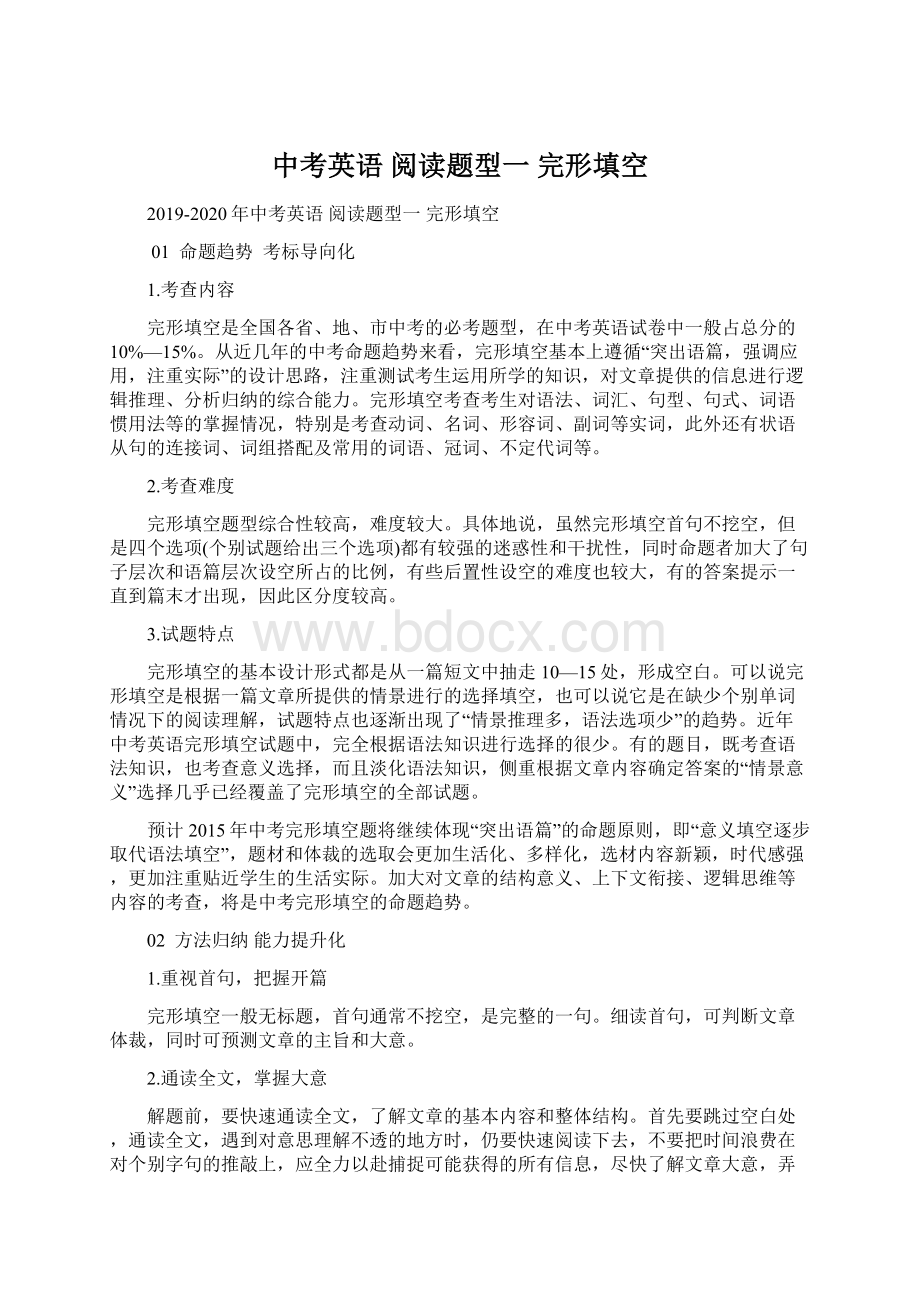中考英语 阅读题型一 完形填空Word文档格式.docx
《中考英语 阅读题型一 完形填空Word文档格式.docx》由会员分享,可在线阅读,更多相关《中考英语 阅读题型一 完形填空Word文档格式.docx(26页珍藏版)》请在冰豆网上搜索。

1.重视首句,把握开篇
完形填空一般无标题,首句通常不挖空,是完整的一句。
细读首句,可判断文章体裁,同时可预测文章的主旨和大意。
2.通读全文,掌握大意
解题前,要快速通读全文,了解文章的基本内容和整体结构。
首先要跳过空白处,通读全文,遇到对意思理解不透的地方时,仍要快速阅读下去,不要把时间浪费在对个别字句的推敲上,应全力以赴捕捉可能获得的所有信息,尽快了解文章大意,弄清楚文章中涉及的“W”,即:
who(人物),what(事件),when(时间),where(地点),why(原因),whose(相互关系)。
切忌看一空填一空,以免断章取义,误解作者的本意。
3.瞻前顾后,逐步填空
“瞻前顾后”,即答题时要回顾上一句,兼顾下一句。
如果一句中有两个空白处待填,在初定答案时要“双管齐下”,在两处同时试填,然后通读全句,通过择优法或排除法最后确定答案。
4.抓住关键词,根据上下文解题
解题时,要善于发现文章中起重要作用的关键词、短语或句子,以便准确了解所提问题的特定语境以及语篇中的内在关系,做到言之有据。
比如文章的第一句、每段的第一句和最后一句等,它们往往是全文或全段的主题句,通过它们可以知道文章的题材、大意、时间、人物和事件等。
5.复读全文,验证答案
把填好的短文通读一遍,将不合题意的答案调整或修改;
如果实在无法确定,可以作推理性猜测,不可放弃不填。
进行核查同时注意以下三点:
(1)上下文的一致性:
即时态语态的一致;
代词、名词、单复数的一致。
(2)语法和惯用法及习惯搭配,甚至从语感入手,看是否符合上下文的逻辑。
(3)段与段、句与句之间的衔接是否连贯。
03整合集训反馈层级化
▲记叙篇
A(2014·
镇江)
Recently,IfeltlikeIreachedaverylowpointinlife.Myrelationshipsweren’tgood,Iwasn’tenjoyingmyclasses,andIfeltlikeIhadnothingto1.Mylifeseemedtobefullofendlesshomework,testsandloneliness.Nothinganyonesaidseemed2tome.Iwasn’tsurewhattodoaboutmyself.AllIwantedwastobehappyagain,butIdidn’tknowwhoorwhatwould3that.
Duringthesedays,Ihadtroublesleeping.Ihadtotakesleepingpillsbutstillwokeupinthemidnight.Ihadno4buttotellmydad.He5thebookTheSecret.Iimmediatelyboughtthee-bookonlineandreadthewholethingthatnight.I’m6quiteastubbornperson,buttheeffectonmymoodafterfinishingthebookwas7.Suddenly,Ifeltlikelifewasbeautifulagain.Ihadneverfeltsuchadeepandquick8inmylifebefore.
Infact,thebook’smessagewasverysimple—thinkpositively(积极地).Thebookhadmanysuccessstoriesabouthowpeoplewereableto9money,soulmates(心灵伙伴)andoldfriendsbackintotheirlives.Istartedlearningtothankeverythinginmylifelikethem.Littlebylittle,IrealizedthatTheSecretcouldonlywork10Ibelievedthesepeople’ssuccessstories.
NowI’msureIcanbringmyselfhappiness.
()1.A.takecareofB.comeupwith
C.lookdownonD.lookforwardto
()2.A.helpfulB.colourful
C.peacefulD.powerful
()3.A.serveB.offer
C.answerD.prevent
()4.A.problemB.idea
C.needD.doubt
()5.A.borrowedB.collected
C.returnedD.recommended
()6.A.normallyB.mainly
C.finallyD.probably
()7.A.realisticB.common
C.obviousD.serious
()8.A.breathB.notice
C.surpriseD.change
()9.A.attractB.control
C.imagineD.mention
()10.A.untilB.when
C.unlessD.before
B(2014·
安徽)
OncetherelivedafarmercalledHenry.Hehadabrother,Mike,intownwhowasanexcellentgardener.Hisskillandhisbeautifultreeswere1everywhere.
Oneday,HenrywenttotowntovisitMike.“Look,mybrother,”saidMike,“Hereisthebest2treefrommygarden.Takeithomeand3itsothatyou,andyourchildren,andyourchildren’schildrencanenjoyit.”Henrywas4withtheappletreeandwentbackhome.Thenextmorning,hebeganto5whereheshouldplantit.
“IfIplantitonthehill,”saidhetohimself,“thewindmightcatchitand6downthefruit;
IfIplantitclosetotheroad,peoplewhopassbywillpicksomeofthem;
ButifIplantit…”
7heplantedthetreeinthecornerbehindhishouse,wherenooneelsecouldnoticeit.Butthetreebore(结出)nofruitthefirstyear,northesecond.ThenHenrysentforhisbrotherandsaidtohim8,“Youhavecheatedme.Thisisthethirdyearanditbringsme9butleaves.”
WhenMikesawwherethetreewasplanted,helaughedandsaid,“Youhaveplantedthetreeinsuchacoldcornerwithout10orwarmth.How,then,couldyouexpectflowersandfruit?
”
()1.A.simpleB.famous
C.similarD.common
()2.A.pearB.grape
C.appleD.banana
()3.A.sellB.wash
C.hideD.plant
()4.A.tiredB.patient
C.pleasedD.popular
()5.A.learnB.wonder
C.realizeD.understand
()6.A.putB.cut
C.pushD.shake
()7.A.FinallyB.Firstly
C.LuckilyD.Certainly
()8.A.happilyB.angrily
C.kindlyD.carelessly
()9.A.nothingB.something
C.everythingD.anything
()10.A.airB.earth
C.waterD.sunlight
C(2014·
河南)
“It’srainingcatsanddogs!
”Grandpashouted.
LittleRichiecamerunningtothewindow.Hewantedtoseethe1fallingfromthesky.Helookedoutofthewindow,butitwas2thattherewerenocatsordogs.Heonlysawsmallpoolsofwaterontheground.
“Man,it’sreallycomingdownoutthere!
”UncleBobagreed3helookedoutofthewindow,too.Richiescratchedhishead(挠头).Whatwascomingdown?
Firsttheytalkedaboutcatsanddogsthat4beseen.Nowsomeonesaid“it”.Whatwasgoingonwiththese5?
“Wow!
”AuntSusieshoutedasshelookedoutofthewindow.“It’srainingreallyhard.”
Richie6hisaunt.“It’sraininghard,”heagreed,“but7arethecatsanddogs?
Grandpalaughed.“Richie,thatjust8it’srainingreallyhard.”
“Sowhydidn’tyoujustsaythat?
”Richie9.Itwasirritating(恼人的)whenpeoplespokeliketheywerenotspeakingEnglishatall.
“Wedid.Youjustdidn’tunderstandthese10.”Richie’scousinsaidwithabigsmile.
“Well,nowIdo.”Richiesaid.
()1.A.tigersandlionsB.pigsandsheep
C.catsanddogsD.chickensandducks
()2.A.importantB.possible
C.necessaryD.strange
()3.A.unlessB.after
C.tillD.though
()4.A.couldn’tB.shouldn’t
C.needn’tD.mustn’t
()5.A.daysB.animals
C.ideasD.people
()6.A.shoutedatB.lookedat
C.laughedatD.pointedat
()7.A.whatB.how
C.whereD.who
()8.A.explainsB.proves
C.meansD.shows
()9.A.orderedB.thought
C.repeatedD.asked
()10.A.sayingsB.questions
C.objectsD.stories
▲说明篇
曲靖)
Insomesciencefictionmovies,peopleinthefuturehavetheirownrobots.Theserobotsarejustlikehumans.Theyhelpwiththehouseworkanddothemost1jobs.
Somescientistsbelievethattherewillbesuchrobotsinthefuture.However,theyagreeitmaytakehundredsofyears.Scientistsarenowtryingtomakerobotslooklikepeopleand2thesamethingsasus.Japanesecompanieshavealreadymaderobotswalkanddance.Thiskindofrobotwillalsobefuntowatch.
ButrobotscientistJamesWhitedisagrees.Hethinksthatitwillbe3forarobottodothesamethingsasaperson.Forexample,it’seasyforachildto4andknowwhereheorsheis.MrWhitethinksthatrobotswon’tbeabletodothis.Butotherscientistsdisagree.Theythinkthatrobotswillbeabletotalktopeople525to50years.
Robotscientistsarenotjusttryingtomakerobotslooklikepeople.Forexample,therearealreadyrobots6infactories.Theserobotslookmorelikehugearms.Theydosimplejobsoverandoveragain.Peoplewouldnotliketodosuchjobsandwouldgetbored.Butrobotswill7getbored.
Inthefuture,therewillbemorerobotseverywhere,andhumanswillhave8worktodo.Newrobotswillhavemanydifferent9.Somewilllooklikehumans,andothersmightlooklike10.Afteranearthquake,asnakerobotcouldhelplookforpeopleunderbuildings.Thatmaynotseempossiblenow,butcomputers,spacerocketsandevenelectrictoothbrushesseemedimpossibleahundredyearsago.Weneverknowwhatwillhappeninthefuture!
()1.A.unpleasantB.pleasant
C.boredD.interesting
()2.A.todoB.doing
C.doD.did
()3.A.easyB.possible
C.excitingD.hard
()4.A.lookupB.wakeup
C.turnupD.putup
()5.A.afterB.before
C.aboutD.in
()6.A.workB.working
C.toworkD.worked
()7.A.noB.ever
C.neverD.always
()8.A.lessB.alittle
C.fewerD.afew
()9.A.namesB.colors
C.sizesD.shapes
()10.A.turtlesB.snakes
C.monstersD.spiders
InChina,veryfewchildrenmakepocketmoney.1,inwesterncountries,mostkidsmakepocketmoneybythemselves.Theymakemoneyinmanydifferent2.
Whenkidsareveryyoung,theirparentshelpthemsellthefruitsoftheirowntreestoneighbours.Kidsmayalsohelp3dohouseworktomakemoneyathome.Whenthey4sixteen,theycanmakemoneybysendingnewspapersorbyworkinginfastfoodrestaurants,5duringthesummerholidays.
Therearemany6ofmakingpocketmoneybykidsthemselves.Firstofall,theylearnthe7ofmoneybyworkinghardsothattheywillnotwasteany.Secondly,theylearnto8moneytobuythingstheyneedorwant,suchasbooks,pencils,movies,andevenclothestheylike.Thirdly,theylearnto9thedailylifeproblemsbyhelpingtheirparentsorothers.Makingpocketmoneyis10forchildrenwhentheygrowup.Thatiswhyparentsencouragetheirkidstomakepocketmoney.
()1.A.AlsoB.Anyway
C.HoweverD.Besides
()2.A.waysB.levels
C.homesD.countries
()3.A.teachersB.friends
C.parentsD.neighbours
()4.A.getB.have
C.catchD.reach
()5.A.reallyB.hardly
C.properlyD.especially
()6.A.choicesB.advantages
C.problemsD.lessons
()7.A.funB.value
C.messageD.purpose
()8.A.countB.waste
C.manageD.change
()9.A.giveupB.lookup
C.dealwithD.meetwith
()10.A.helpfulB.careful
C.beautifulD.successful
呼和浩特)
Earlyinthemorning,atnoon,orintheeveninginbigcitiesandinthecountryside,allovertheUnitedStates,youcanseeAmericansrunning—menandwomen,youngandold.Peoplerun1—alongthebeachesofCalifornia,2CentralParkinNewYork,downquietstreetsinsmalltownsor